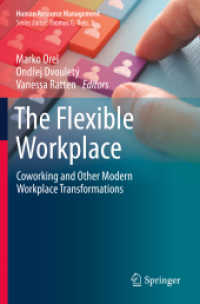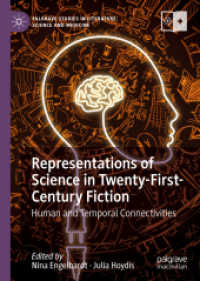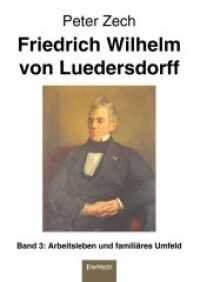- ホーム
- > 洋書
- > ドイツ書
- > Humanities, Arts & Music
- > Humanities
- > general surveys
Description
(Short description)
Im Fokus des Bandes stehen polnische Autoren, die den Ersten Weltkrieg explizit oder implizit thematisieren, z. B. Roman Hernicz, Juliusz Kaden-Bandrowski, Zofia Nalkowska, Edward Slonski, Andrzej Strug, Kazimierz Tetmajer oder Stefan _eromski, . Literarische Texte als Medien des kollektiven Gedächtnisses
(Text)
Literary texts in Polish literature written between 1914 and 1920 combine specific meaningful strategies and serve as a medium for transporting collective memories. In them, collectively important places of remembrance are constructed and established in the context of power struggles, interests and group-related needs for meaning. This book focuses on authors like Roman Hernicz, Juliusz Kaden-Bandrowski, Zofia Nalkowska, Edward Slonski, Andrzej Strug, Kazimierz Tetmajer and Stefan _eromski, who explicitly or implicitly discuss World War II themes in their work. They present both realistic and critical perspectives on the events and processes of the "Great War" juxtaposed against proleptic, irredentist, patriotic and pathetic points of view.
(Text)
In the case of Polish literature written from 1914 to 1920, literary texts are seen as media of collective memory, which are combined with specific meaningful strategies. Polish authors such as Roman Hernicz and Juliusz Kaden-Bandrowski, who discussed in their literary works explicitly or implicitly the theme of the First World War, represent both a realistic and critical perspective on the events and processes of the Great War, as well as a proleptic, irredentist, patriotic and pathetic points of view. The First World War is the catalyst for the strengthening of an excessively religious community experience and national sentiment.
(Author portrait)
Prof. Dr. Pawel Zimniak lehrt Neuere deutsche Literaturwissenschaft und Literaturdidaktik und ist Direktor des Instituts für Germanistik der Universität Zielona Góra, Polen.








